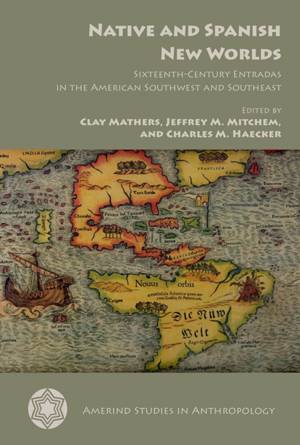
Bedankt voor het vertrouwen het afgelopen jaar! Om jou te bedanken bieden we GRATIS verzending (in België) aan op alles gedurende de hele maand januari.
- Afhalen na 1 uur in een winkel met voorraad
- In januari gratis thuislevering in België
- Ruim aanbod met 7 miljoen producten
Bedankt voor het vertrouwen het afgelopen jaar! Om jou te bedanken bieden we GRATIS verzending (in België) aan op alles gedurende de hele maand januari.
- Afhalen na 1 uur in een winkel met voorraad
- In januari gratis thuislevering in België
- Ruim aanbod met 7 miljoen producten
Zoeken
Native and Spanish New Worlds
Sixteenth-Century Entradas in the American Southwest and Southeast
€ 57,95
+ 115 punten
Omschrijving
Spanish-led entradas--expeditions bent on the exploration and control of new territories--took place throughout the sixteenth century in what is now the southern United States. Although their impact was profound, both locally and globally, detailed analyses of these encounters are notably scarce. Focusing on several major themes--social, economic, political, military, environmental, and demographic--the contributions gathered here explore not only the cultures and peoples involved in these unique engagements but also the wider connections and disparities between these borderlands and the colonial world in general during the first century of Native-European contact in North America. Bringing together research from both the southwestern and southeastern United States, this book offers a comparative synthesis of Native-European contacts and their consequences in both regions. The chapters also engage at different scales of analysis, from locally based research to macro-level evaluations, using documentary, paleoclimatic, and regional archaeological data. No other volume assembles such a wide variety of archaeological, ethnohistorical, environmental, and biological information to elucidate the experience of Natives and Europeans in the early colonial world of Northern New Spain, and the global implications of entradas during this formative period in borderlands history.
Specificaties
Betrokkenen
- Uitgeverij:
Inhoud
- Aantal bladzijden:
- 400
- Taal:
- Engels
- Reeks:
Eigenschappen
- Productcode (EAN):
- 9780816531226
- Verschijningsdatum:
- 1/05/2014
- Uitvoering:
- Paperback
- Formaat:
- Trade paperback (VS)
- Afmetingen:
- 154 mm x 229 mm
- Gewicht:
- 535 g

Alleen bij Standaard Boekhandel
+ 115 punten op je klantenkaart van Standaard Boekhandel
Beoordelingen
We publiceren alleen reviews die voldoen aan de voorwaarden voor reviews. Bekijk onze voorwaarden voor reviews.








